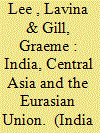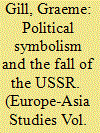|
|
|
Sort Order |
|
|
|
Items / Page
|
|
|
|
|
|
|
| Srl | Item |
| 1 |
ID:
183509


|
|
|
|
|
| Summary/Abstract |
Initially Western scholars generally assumed that Russia would become a ‘normal’ democratic state, taking its place in the existing world order. They attributed this to Yeltsin's democratic credentials, but they could do so only by ignoring the clear flaws in Russian democracy as it developed under his presidency. This means that when Russia moved in a more authoritarian direction under Yeltsin’s successor Vladimir Putin, the explanation that most gave for this was the agency of Putin. He was seen as reinstating many of the elements of the Soviet legacy, including the role of the security apparatus. Putin’s rise was also seen as decisive in the shift of Russia’s international position from one seeking accommodation within the existing international architecture to one seeking to revise that architecture in ways objectionable to the West. The result is said to be a new cold war. But there is disagreement about how this should be understood: is Russia acting as a traditional great power, and therefore understandable through the established principles of international relations, or is she still claiming Soviet-style exceptionalism? What is clear, and many do not appreciate, is that even when Putin has gone, Russia’s core interests will likely not change.
|
|
|
|
|
|
|
|
|
|
|
|
|
|
|
|
| 2 |
ID:
138863


|
|
|
|
|
| Summary/Abstract |
India has had long-standing interests in the Central Asian region. Vladimir Putin’s proposal for a Eurasian Union and the recent announcement of the creation of a Eurasian Economic Union (EEU) raises some important questions for this. What impact will the EEU have on Indian ambitions? We argue that all three Indian initiatives to ‘connect’ to Central Asia—the International North South Corridor, the IPI, and TAPI—now either have Russian support or involvement and do not pose a threat to Russia’s interest in maintaining its status as ‘first among equals’ in Central Asia. Further, if the proposed EEU gains traction it will enhance Russian influence over the states of Central Asia, which could in turn enhance Indian interests by facilitating greater access to trade and energy resources, blunting future Chinese expansion and providing a barrier to any expansion of Pakistani influence in the region.
|
|
|
|
|
|
|
|
|
|
|
|
|
|
|
|
| 3 |
ID:
118435


|
|
|
|
|
| Publication |
2013.
|
| Summary/Abstract |
When Gorbachev came to power he inherited not simply a system in crisis, but a structure of symbols that was embedded within the broader political system and which was also in crisis. Given the ideocratic nature of the Soviet system, any change to that system would require symbolic change as well. This essay charts how Gorbachev sought to come to grips with this problem, investing some symbols with new meaning while rejecting others. It shows how ultimately he was unable to produce a new, coherent narrative.
|
|
|
|
|
|
|
|
|
|
|
|
|
|
|
|
| 4 |
ID:
030985


|
|
|
|
|
| Publication |
Houndmills, The Macmillan Press Limited, 1988.
|
| Description |
xi, 264p
|
| Standard Number |
0333387910
|
|
|
|
|
|
|
|
|
|
|
|
Copies: C:1/I:0,R:0,Q:0
Circulation
| Accession# | Call# | Current Location | Status | Policy | Location |
| 029856 | 324.240750947/GIL 029856 | Main | On Shelf | General | |
|
|
|
|
| 5 |
ID:
167554


|
|
|
|
|
| Summary/Abstract |
One of the key characteristics of Stalinism was the relationship between its formal and informal aspects. This is reflected clearly in the way in which, over time, the formal institutions of rule were supplanted by more informal mechanisms of decision-making. However, although the formal institutions seemed to atrophy, they were not abolished, but continued to become the basis upon which the post-Stalin leadership rested. The essay explains why one of those institutions, the Politburo, was maintained despite its atrophy as a decision-making organ, explaining this principally as a result of both strategic and tactical considerations.
|
|
|
|
|
|
|
|
|
|
|
|
|
|
|
|
|
|
|
|
|